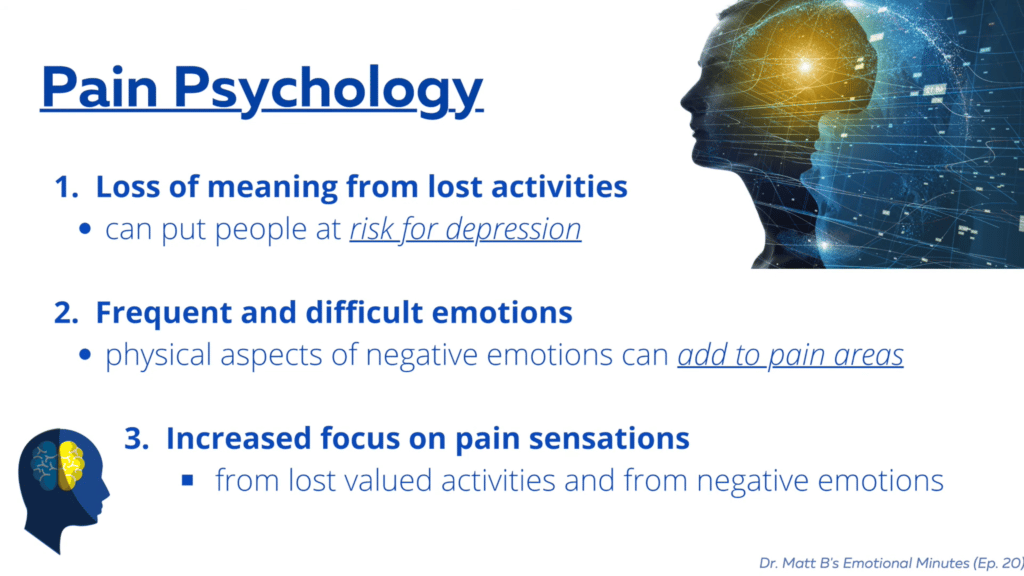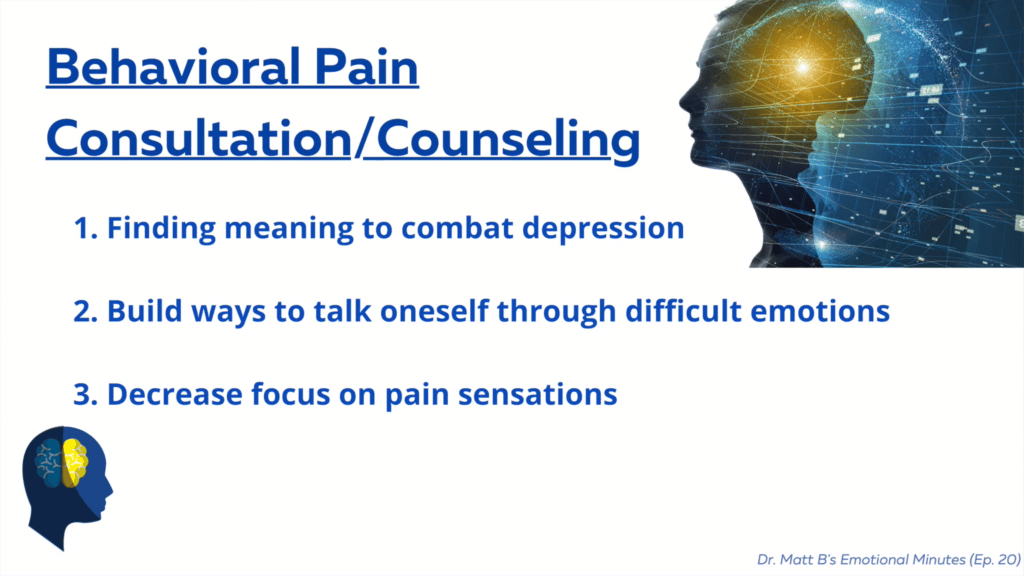There are many aspects of physical pain that can be affected by emotional or behavioral changes, thus forming “mind-body connections” that individuals sometimes speak about.
In the case of chronic physical pain, sometimes individuals ask “Why would I see a psychologist or a behavioral specialist as part of chronic pain treatment?” This video explores a few key physical-psychological relationships that can have an impact on people’s pain experience and how certain treatments can help relieve chronic pain.
If you are interested in tool and strategies to help cope with chronic pain, there is a great workbook to help!
Welcome Back, I’m Dr. Matt B with your Emotional Minutes. Today we’re talking about chronic pain. In particular, the psychology of chronic pain. Part of what I do is working in a chronic pain clinic part-time.
Why is a Psychologist in a Chronic Pain Clinic?
Patients may ask why there is a psychologist in a chronic pain clinic or why they need to see one. They may even ask what psychology or behavior has to do with chronic pain. A lot of patients worry that, as psychologists, we will tell them that their pain is all in their head. Some even fear we will take their meds away because of the opioid epidemic and things like that.
Psychologists are in chronic pain clinics all across the country. The prime reason for this is that pain can have a huge effect on people’s lifestyles and behaviors. In some cases pain causes them to engage in behaviors that effect their mood and how they interact with others.
The reason psychologists work in pain clinics is to understand how those things might affect the pain experience. Once they know how it influences the experience, they can find ways to help.
What Psychologists Look For: Pulling Away
When we look at chronic pain from a behavioral or psychological stand point, there are a few key pieces we hone in on.
The first is changes in activities and lifestyle. Pain can prevent people from doing things that they enjoy. For some patients, pain leads them to stop doing all activities, hobbies, or work, even when it might not be physically strenuous. As they pull away, they lose contact with things that give them a sense of joy, purpose, or meaning. That can put them at risk for depression.
What Psychologists Look For: Negative Emotions
The second area concerns emotions and emotional reactions. Pain can naturally provoke frustration, anger, or anxiety. For some, those emotions can be really hard to deal with. Furthermore, if they’re experiencing those emotions constantly and are not able to cope with them, it can cause patients to ruminate on how unfair or difficult it is.
One of the reasons that we look at emotional reactions is sympathetic activation, or activation of the sympathetic nervous system. Basically, if you are feeling things like frustration, anger, or anxiety, the body responds by engaging certain processes. This includes increases in heart rate, breathing, and blood pressure, as well as things like muscle tension. A lot of these symptoms can inflame people’s pain and make it worse or more difficult to experience.

Results of Pulling Away and Negative Emotions
When people experience difficulties in one or both of those areas, it can lead them to focus on their pain a lot more. Now, pain is real. It’s not all in people’s heads. But these pieces can lead people to concentrate on their pain to an unhealthy degree; Their pain is always on their mind and that can make the pain experience more difficult as well.
Behavioral Pain Counseling
When people experience difficulties with any of those things, we recommend behavioral pain counseling to support them. Behavioral pain counseling looks at the things I mentioned and finds ways to help people experience a sense of meaning and purpose again.
One of the goals is to limit depression and decrease their focus on the pain. It also assists people in finding ways to cope with the emotional reactions that come up. Thus, they don’t also experience as much of the physical responses in the body that come along with pain. Chronic pain can be something that is extremely difficult for people.




